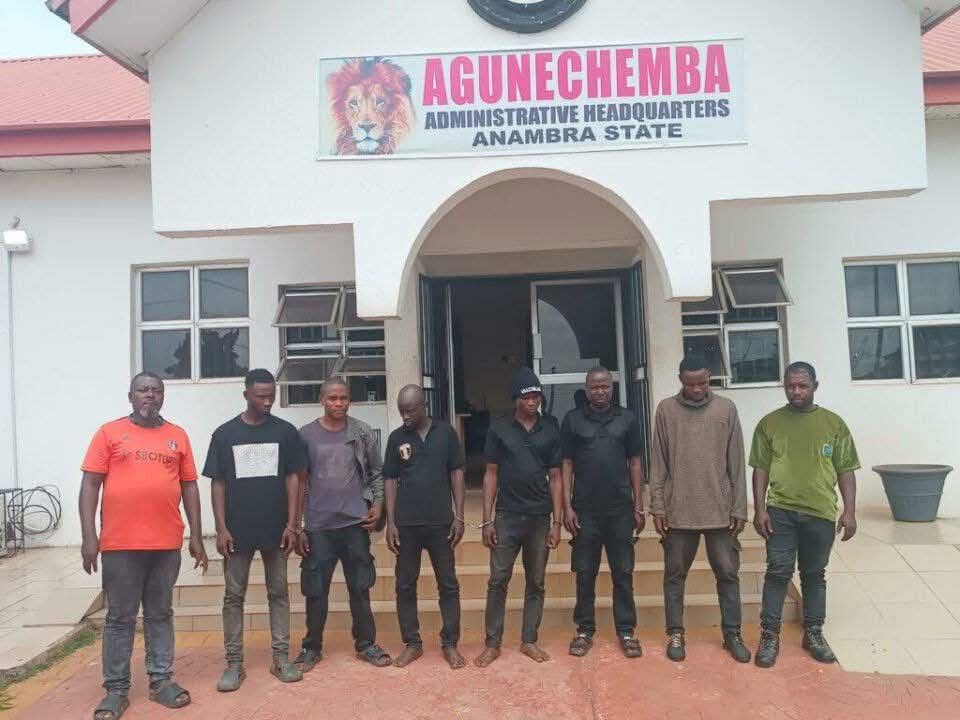It began as an ordinary day in the quiet town of Oba, Idemili South. But by nightfall, the nation was watching in collective horror as a video circulated online—raw, brutal, and utterly unforgettable. A young woman, barely out of university, serving her country in the National Youth Service Corps (NYSC), was dragged from her lodge by a mob of armed vigilantes, accused baselessly of internet fraud, and stripped naked while pleading for mercy.
Her name is Jennifer Elobor. Her attackers were not criminals in the shadows—but sanctioned community security operatives: members of the Agunechemba Security Outfit, an Anambra State vigilante group operating under supposed authority and oversight.

Within 48 hours of public outrage, Governor Chukwuma Soludo acted. He dismissed all eight involved operatives, describing the assault as “utterly condemnable” and outside the mandate of the security outfit. “This administration has zero tolerance for brutality, unprofessionalism, or abuse of office,” his special adviser on community security, Ken Emeakayi, declared.
But now, Nigerians are asking: Is dismissal enough?
While the swift sack may have temporarily calmed public fury, many are warning against reducing the response to administrative optics.
“This wasn’t a case of dereliction of duty. It was a violent crime—assault, public indecency, false imprisonment, and potentially attempted sexual violence,” said Dr. Chidipeters Okorie, the national coordinator of Common Cause Nigeria, a human rights organization based in Abuja. “We are talking about crimes that carry prison sentences. Termination from duty is not justice—it’s a beginning, not an end.”
Social media, the crucible where the video first went viral, is now ablaze with a new campaign: #JusticeForJennifer. The demands are clear: not just prosecution, but public trials, systemic reform, and accountability for those who empowered the Agunechemba operatives in the first place.
The footage that ignited public outrage is difficult to watch. Jennifer Elobor is seen being dragged out, as more than five men—fully armed and wearing tactical gear—storm her residence. Despite showing her official NYSC identification, she is mocked, beaten, her clothes torn from her body as onlookers cry out in horror.
Legal experts now argue that the vigilantes could face multiple charges under Nigerian law, including assault occasioning grievous harm, public indecency, unlawful arrest, and abuse of power under the Community Policing Act.
Despite Governor Soludo’s insistence that the men will be prosecuted, concerns initially grew over the silence from law enforcement. That changed on Tuesday, when the Anambra State Police Command confirmed that all eight suspects had been arrested and are currently in custody. Police officials stated that investigations are underway and that the suspects will be charged to court upon conclusion.
This development, while welcomed, has done little to quell broader concerns over impunity and accountability.
This incident has cast a harsh spotlight on Governor Soludo’s legacy on security reform. The Agunechemba Security Outfit, like many local vigilante groups across Nigeria, was born out of necessity in response to spiraling insecurity and police overstretch.
But critics argue the state has failed in ensuring clear oversight, training, and human rights safeguards for these quasi-state forces.
“The vigilantes are meant to complement security—not become warlords,” said Ijeoma Udeh, Director of Policy at the Civil Society Coalition for Democratic Security. “Soludo has the chance to show Nigerians that community policing can work—but only if there’s transparency, accountability, and zero impunity.”
Sources within the Anambra State government confirm that an internal review of the Agunechemba Security Outfit’s operations has been launched, and retraining modules focused on human rights and gender sensitivity are being drafted. However, critics argue that true reform must be built on precedent-setting punishment.
“There must be trials. There must be convictions. Otherwise, we are merely recycling brutality under new uniforms,” Udeh added.
Jennifer Elobor is recovering—but she will never be the same.
According to government sources, her medical bills, damaged phone and laptop have been fully paid, but her family is yet to receive a formal apology from the state.
But for Jennifer, the humiliation lives beyond material compensation. She has yet to speak publicly, but those close to her describe a young woman shaken to her core.
“Her only crime was wearing her NYSC uniform,” said a fellow corps member. “Now she’s afraid to step outside without fear of being attacked again.”
Women’s rights groups have seized the moment to launch a broader conversation about violence against women in uniforms—especially those deployed in rural or semi-urban communities where traditional policing is weak or absent.
“The psychological trauma of public stripping, especially in a conservative society, is immense,” said Ngozi Maduka, coordinator of the Women Against Brutality Foundation. “It’s time for Nigeria to classify public stripping and forced nudity as a form of gender-based violence with enhanced penalties.”
Across the country, the Elobor incident is forcing a reckoning. In Lagos, Abuja, Port Harcourt, and beyond, voices are rising—not just for Jennifer, but for the countless victims of extrajudicial violence whose stories never reached the public eye.
Lawmakers in the National Assembly have hinted at plans to review the legal framework surrounding community security outfits, with special attention on gender-based violence and abuse of power.
“We cannot have parallel armies with no consequences,” one senator remarked anonymously. “This is a chance to reset the structure before it collapses into complete lawlessness.”
Governor Soludo has promised action—and Nigerians are watching. But in the court of public opinion, words are no longer enough.
Dismissals make headlines. Convictions make justice.
For Jennifer Elobor, for the thousands of corps members across Nigeria, and for every citizen who has suffered violence at the hands of those paid to protect them, justice must mean more than a press release.
It must mean handcuffs, courtrooms, and ultimately—a system that works.